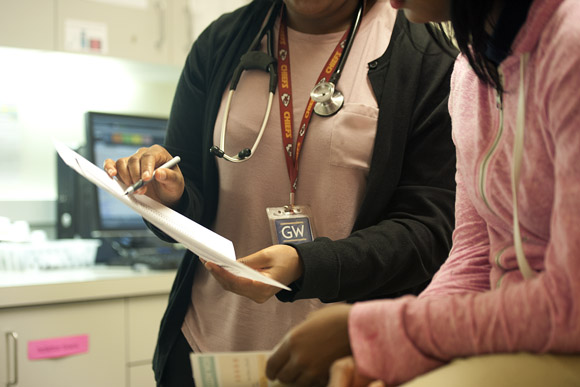This isn't your mom's school nurse; it's a full medical center—in a high school. These school-based health centers are taking off in D.C. Here's why that's a good thing.
While a school nurse can hand out band-aids and Tylenol, Jason Beverly, a medical provider at Anacostia Senior High School, can prescribe and administer antibiotics, allergy meds and more.
Beverly is part of a movement in over 2,000 "school-based health centers" across the nation that aim to change medical care for school-aged youth. These centers, in several D.C. public high schools, provide a full range of health services from treatments for the common cold, headaches and asthma, administer vision and hearing screenings, and help students stay up to date on immunizations and physicals. Some centers even have full dental laboratories.
Forget what you remember about the school nurse—this is serious healthcare.
“We function as a full-service primary adolescent care clinic, so we augment the services that have been traditionally provided by the school nursing program,” says Beverly, family nurse practitioner and full-time healthcare provider at Anacostia Senior High School.
"We assist children in staying in school and graduating successfully."
Each center is a collaboration with DCPS, the DC Department of Heath and local health institutions. The Anacostia center—entering its third year-- is run by Medstar Georgetown University Hospital. About 60 percent of the student body—500 students—are signed up to receive services.
In addition to keeping students' health intact, the most fundamental aspect of the centers is their ability to keep students’ heads in the books.
“We assist children in staying in school and graduating successfully,” says Beverly.
Anacostia’s center sees an average of 12 students per day, who are given treatment then sent back to class, whereas previously, students would have to leave school, travel to a clinic and miss countless hours of class time, or perhaps not be treated at all for minor symptoms. In other words, if you can't bring the student to the doctor, bring the doctor to the student.
While short-term treatment may be their expertise, the centers have also been effective in addressing issues that may steer students off track for the long haul.
Teen pregnancy is one of the leading preventers of graduation among female students. Nationally, only about 50 percent of teen mothers go on to graduate by the age of 22, compared to approximately 90 percent of teen girls who do not get pregnant while in high school, according to the Centers for Disease Control and Prevention.

"In accordance with the best evidence and guidelines for clinical care of adolescents, our clinics really emphasize the use of ‘long active reversible contraceptives’ or LARCs,” says, Dr. Danielle Dooley, medical director at Unity Health Care, which runs centers at Eastern, Woodson, Ballou and Cardozo senior high schools. “These are methods that have been found to be extremely safe and effective for teens and many professional organizations support and recommend their use in teens.”
According to the D.C. code, minors don't need their parents' permission to receive birth control, even LARCs like intrauterine devices (IUDs) and contraceptive implants, which will prevent pregnancy for about three to five years—the time it takes a student to graduate high school—versus short-term contraceptives such as condoms.
To complement medical services, Ballou, where a school-based health center opened in 2011, has also been successful in conducting workshops and facilitating partnerships directed by its family planning education coordinator, Charlotte Hager (who recently relocated to Cardozo High School's new center). Significant to this position is one-on-one counseling to assist students in making sense of a multitude of issues, most often family planning. For the past two years, after students received services such as pregnancy tests, STD tests or STD treatments, they were referred to Hager, who created personalized action plans for students, based on their medical records and any foreseeable health risks.
"It’s fascinating to watch [students] set the foundation for the adulthood and life they want to live after they get out of school."
Not only is Hager a public health professional, she has also become a trusted advisor for many students who lack that presence in their lives.
“It’s quite disheartening how often students feel that they don’t have an adult they can really talk to about very serious, confidential issues,” says Hager, who became known as the “birth control woman” among students. “A lot of research and work that I've done in the past has focused on how the number one protective factor against teen pregnancy is an adult or mentor in a child's life, and that's the foundation for a lot of the work I do. The services I provide really set myself as an example of a mentor and I try to create a safe, secure and non-judgmental space where kids can talk to me.”
This fall, Hager has relocated to Unity’s newest center at Cardozo Senior High school, which opened Spring 2014. As a case manager for students in the northwest community, issues are expected to be more in depth, from addressing students’ access to food, housing, clothing and insurance to organizing legal services for student immigrants from Central and South America.
“It’s fascinating to watch [students] set the foundation for the adulthood and life they want to live after they get out of school,” says Hager.